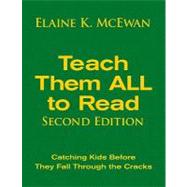
What is included with this book?
| List of Figures | |
| About the Author | |
| Preface | |
| The Story Behind This Book | |
| How the Reading Puzzle Has Changed | |
| The Meaning of ALL | |
| The Goals of This Book | |
| Who This Book Is For | |
| Overview of the Contents | |
| Program Recommendations | |
| Special Features of the Second Edition | |
| Acknowledgments | |
| Introduction | |
| Shift Your Paradigms | |
| Put Together the Reading Puzzle | |
| Become an Instructional Leader | |
| Summarizing the Introduction | |
| Notes | |
| Phonemic Awareness | |
| What Is Phonemic Awareness and How Do Students Acquire It? | |
| When Should Phonemic Awareness Be Taught? | |
| The Role of Phonemic Awareness in Skilled Reading | |
| Scientific Evidence for Phonemic Awareness Instruction | |
| Effective Instructional Practices for Teaching Phonemic Awareness | |
| Guidelines for Implementing Phonemic Awareness Instruction | |
| Summarizing Chapter 1 | |
| Notes | |
| Phonics | |
| What Is Phonics and How Do Students Learn to Decode? | |
| When Should Phonics Be Taught? | |
| The Role of Phonics in Skilled Reading | |
| Scientific Evidence for Phonics Instruction | |
| Effective Instructional Practices for Teaching Phonics | |
| Summarizing Chapter 2 | |
| Notes | |
| Spelling | |
| What Is Spelling and How Do Students Become Good Spellers? | |
| When Should Spelling Be Taught? | |
| The Role of Spelling in Skilled Reading | |
| Scientific Evidence for Spelling Instruction | |
| Effective Instructional Practices for Teaching Spelling | |
| Intensive Spelling-Based Reading Interventions | |
| Summarizing Chapter 3 | |
| Fluency | |
| What Is Fluency and How Do Students Become Fluent Readers? | |
| When Should Fluency Be Taught? | |
| The Role of Fluency in Skilled Reading | |
| Scientific Evidence for Fluency Instruction | |
| Effective Instructional Practices for Facilitating Fluency | |
| Summarizing Chapter 4 | |
| Word and World Knowledge | |
| What Is Word and World Knowledge and How Do Students Acquire It? | |
| When Should Word and World Knowledge Be Taught? | |
| The Role of Word and World Knowledge in Skilled Reading | |
| Scientific Evidence for Teaching Word and World Knowledge | |
| Effective Instructional Practices for Teaching Word and World Knowledge | |
| Summarizing Chapter 5 | |
| Comprehension | |
| What Is Comprehension and How Do Students Become Skilled Comprehenders? | |
| When Should Comprehension Be Taught? | |
| The Role of Comprehension in Skilled Reading | |
| Scientific Evidence for Teaching Comprehension | |
| Effective Instructional Practices for Teaching Comprehension | |
| Take Comprehension Instruction to the Next Level | |
| Summarizing Chapter 6 | |
| Reading a Lot | |
| What Is Reading a Lot and How Do Student Become Voracious Readers? | |
| When Should Reading a Lot Be Taught? | |
| The Role of Reading a Lot in Skilled Reading | |
| The Lack of Scientific Evidence for Reading a Lot | |
| Effective Instructional Practices for Teaching Reading a Lot | |
| Summarizing Chapter 7 | |
| Writing | |
| What Is Writing and How Do Students Learn to Write? | |
| When Should Writing Be Taught? | |
| The Relationship of Reading and Writing | |
| Scientific Evidence for the Writing-Reading Connection | |
| Notching Up Reading and Writing Instruction | |
| Summarizing Chapter 8 | |
| A Reading Culture | |
| Welcome to Gering | |
| The Gering "No Excuses" Model | |
| Paradigms | |
| Academic Focus | |
| Curriculum, Instruction, and Assessment | |
| Grouping and Time | |
| Professional Development | |
| Expectations | |
| Sustainability Beyond NIFDI and RF | |
| Summarizing Chapter 9 | |
| References | |
| Index | |
| Table of Contents provided by Ingram. All Rights Reserved. |
The New copy of this book will include any supplemental materials advertised. Please check the title of the book to determine if it should include any access cards, study guides, lab manuals, CDs, etc.
The Used, Rental and eBook copies of this book are not guaranteed to include any supplemental materials. Typically, only the book itself is included. This is true even if the title states it includes any access cards, study guides, lab manuals, CDs, etc.